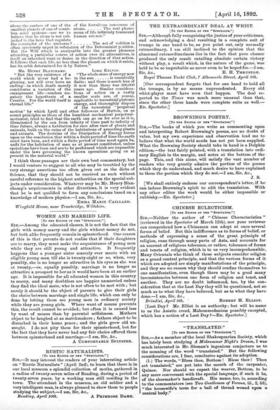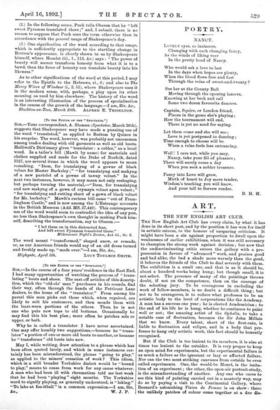"TRANSLATED."
[To THE EDITOR 01 THZ " 81.11CTATOR."3 Sin,—As a member of the local Shakespearian Society, which has lately been studying A Midsummer Night's Dream, I was much interested in Mr. Sloman's ingenious conjecture as to the meaning of the word "translated." But the following considerations are, I fear, conclusive against its adoption. (1.) The words, "Bless thee, Bottom ! Bless thee! Thou art translated," are put into the month of the carpenter, Quince. Nor should we expect the weaver, Bottom, to be any more conversant with the special language, if such it be, of the shoemaker's handicraft. His name, too, is, according to the commentators (see Two Gentlemen of Verona, iii., 2,53), "the housewife's term for a ball of thread wound upon a central body."
(2.) In the following scene, Puck tells Oberon that he "left sweet Pyramus translated there ;" and, I submit, there is no reason to suppose that Puck uses the term otherwise than in accordance with the general usage of Shakespeare's day.
(3.) One signification of the word according to that usage, which is sufficiently appropriate to the startling change in Bottom's appearance, is clearly shown to us by Shakespeare himself, where Hamlet (iii., 1., 113, &e.) says "The power of beauty will sooner transform honesty from what it is to a bawd, than the force of honesty can translate beauty into his likeness."
As to other significations of the word at this period, I may refer to the Epistle to the Hebrews, xi., 6; and also to The Merry Wives of Windsor (i., 3, 51), where Shakespeare uses it in the modern sense, with, perhaps, a play upon its other meaning, as used by him elsewhere. The history of the word is an interesting illustration of the process of specialisation in the course of the growth of the language.—I am, Sir, &c.,

































 Previous page
Previous page